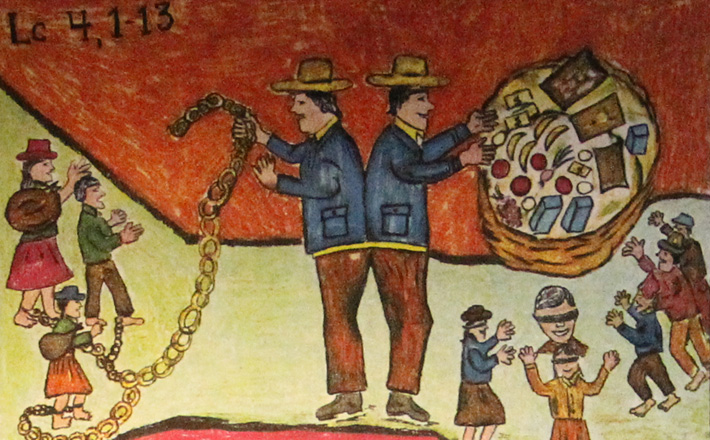Commentary on Psalm 91:1-2, 9-16
This psalm is an exultant hymn of proclamation and praise.
The psalmist’s trust in God is absolute, and he encourages his hearers to share that certainty.
“For he will command his angels concerning you
to guard you in all your ways.
On their hands they will bear you up,
so that you will not dash your foot against a stone”
(verses 11-12).
There is no doubt that God is ready to help the person in need, and God’s power to do so is boundless.
“Because you have made the Lord your refuge,
the Most High your dwelling place,
no evil shall befall you,
no scourge come near your tent”
(verses 9-10).
We can put our trust in all kinds of persons and things, our first choice generally being ourselves, but the psalmist insists there is only one place where we can be truly safe — in the shelter of the Most High.
Yet life demands that we be prepared for sorrow and loss every step of the way. In the preceding psalm (Psalm 90:10) we are told:
“The days of our life are seventy years,
or perhaps eighty, if we are strong;
even then their span is only toil and trouble;
they are soon gone, and we fly away.”
Not only does evil befall us, we constantly act as its agents. Our lives are fraught with fears of all sorts and deceit beyond measure. We worry about our health, our finances, our children’s welfare, global warming, unemployment, poverty, natural disasters, and the burden keeps growing year by year. What, then, can the psalmist mean when he assures us that we are in the care of God’s holy angels?
In Matthew 4:1-11, the evangelist tells the story of the temptation of Jesus. The Lord is baptized by John, on which occasion God says of him, “This is my Son, the Beloved, with whom I am well pleased.” Immediately, Jesus is led up by the Spirit into the wilderness to be tempted by the devil. The second challenge issued by the evil one echoes Psalm 91.
Then the devil took him to the holy city, and placed him on the pinnacle of the temple, saying to him,
“If you are the Son of God, throw yourself down;
for it is written,
‘He will command his angels concerning you,’
and ‘On their hands they will bear you up,
so that you will not dash your foot against a stone.”
Jesus said to him, “Again it is written, ‘Do not put the Lord your God to the test'” (4:5-7).
When the series of temptations is complete, the devil leaves Jesus, and “suddenly angels came and waited on him” (4:11). Jesus claims God as his refuge and fortress. He dwells under the protection of God’s wings. But he also knows “the pestilence that stalks in darkness” and “the destruction that wastes at noonday” (Psalm 91:6, omitted from the lectionary). It is his way we are called to follow. We live between the holy times of his presence with us on earth, and until he comes again, we are home free but not yet home safe.
In a treatise from the year 1520 entitled “The Freedom of a Christian,” Martin Luther describes Christians in paradoxical terms. We are at one and the same time perfectly free lords of all, subject to none, and perfectly dutiful servants of all, subject to all. Lordship is the fruit of faith that clings to God’s Word and rests secure in the shelter of the Most High. At the same time we live in the midst of boundless need and evil. Here we are called to be servants and to accept the inevitable costs of this discipleship. Whatever happens, our fortress will not fall; the power of sin, the very gates of hell cannot prevail against it.


February 21, 2010